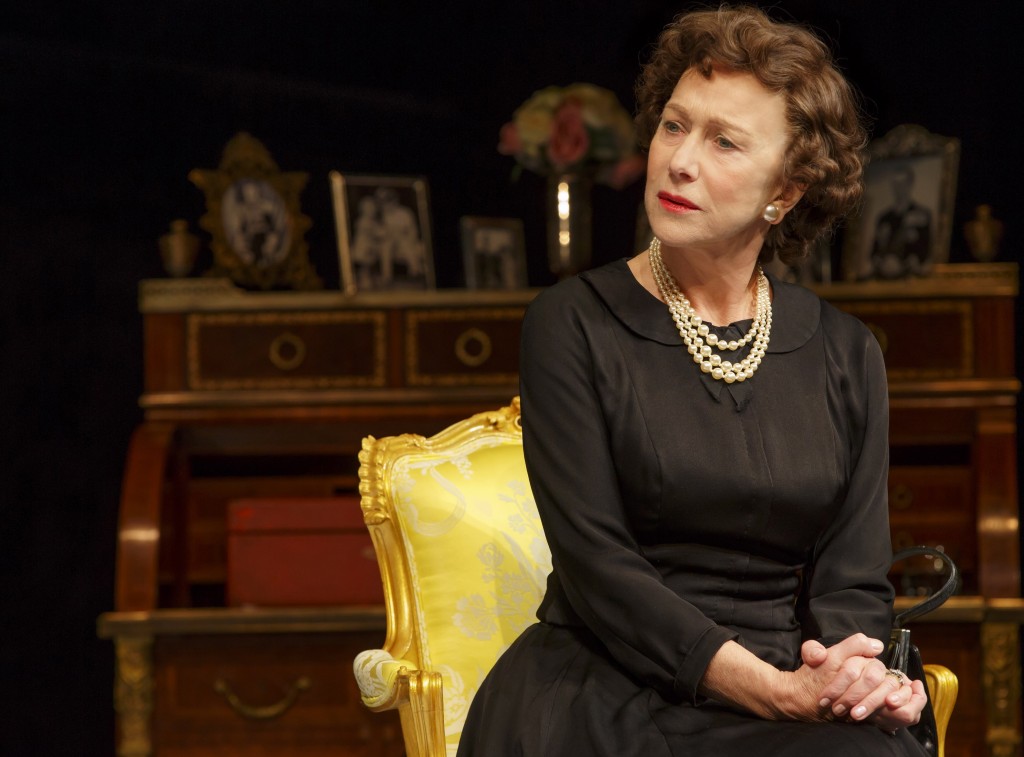The Audience, Peter Morgan’s play about Queen Elizabeth II and her prime ministers, begins with the ever-so-upper-crust Geoffrey Beevers acting as combination tour guide and Buckingham Palace major-domo of protocol. He explains the concept of the weekly meetings between the sovereign and the head of her government, and describes the royal room in which these confabs take place with loving attention paid to the furniture’s period and makers. As Bob Crowley’s elegant set rolls in, we transition into the first of many short vignettes depicting these historic encounters, with Helen Mirren and Dylan Baker accurately made up and costumed to resemble Her Highness and John Major, Conservative PM, 1990-97. Morgan then crisscrosses through the years switching from various leaders as Mirren miraculously sheds and gains years as easily as she dons and discards Crowley’s period-defining costumes. There are occasional side-visits with a child version of the Queen, confiding her struggles with awesome responsibilities to her older self. This tour-guide approach is fitting because Morgan’s script is sort of a package-deal view of Elizabeth’s seven-decade reign with the Broadway theatergoers cast as worshipful Anglophiles being treated to a Greatest-Hits medley of historic moments.
Morgan’s screenplay for The Queen also starred Mirren in an award-winning monarchial performance (she copped the Oscar for that film, took the Olivier for the London run of The Audience and will likely snatch the Tony for this Broadway engagement). That film concentrated on just one crisis in Elizabeth’s long tenure—the death of Princess Diana and the British public’s anger at the throne’s perceived lack of sorrow—and her connection with one first minister, Tony Blair. This specific focus allowed for deeper insights into the monarch’s personality, her feelings about her tradition-laden position in a modern world, and her place in posterity. (Tony Kushner’s script for Lincoln was similarly pinpointed and sharp.) With The Audience, Morgan attempts to cover too much ground. As a result, we get a snapshot glimpse of recent English history and a brief peek at Elizabeth’s psyche.
In spite of this smash-and-run approach, Stephen Daldry’s staging is expertly smooth and there are many effecting moments, facilitated by a proficient cast combining veterans of the West End run and Americans new to the show.

Credit: Joan Marcus
Among the British holdovers aside from Mirren, Richard McCabe is given the most opportunity to shine as the rough-hewn Labour leader, Harold Wilson. In several scenes, McCabe adds color and quirk to Wilson’s bond with the sovereign which grows from guarded antagonism to genuine affection. Beevers is an effective master of ceremonies and Michael Elwyn is elegantly deceptive as the tragic Anthony Eden whose government was destroyed by the Suez Canal fiasco of the mid-1950s. Representing the American contingent, Dakin Matthews is a spry and mischievous Winston Churchill, Judith Ivey exudes no-nonsense authority which shakes even the Queen as a frosty and frosted Margaret Thatcher, and Dylan Baker tellingly illuminates Major’s ambivalence towards his job and his doubts about the necessity of the monarchy.
First and foremost, of course, is Mirren, simultaneously regal and human. Her Elizabeth is much more than a figurehead, ever mindful of her impact upon her subjects yet intensely seeking to maintain a space for personal life. Mirren masterfully hits all the notes from dry humor (watch as she reacts to a cell phone going off in her ever-present purse) to righteous anger (exploding at Major for suggesting the Royal Family pay income tax) to tricky political maneuvering (pleading with Churchill and Thatcher to achieve her ends, successfully and not so much.)
Though her film version of Elizabeth gave us a more intimate look at the queen and this stage edition is more of a condensed overview of her tenure on the throne, Mirren makes it a command performance.
March 8—June 28. Gerald Schoenfeld Theatre, 236 W. 45th St., NYC. Tue., Thu., 7 p.m.; Fri.—Sat., 8 p.m.; Wed., Sat., 2 p.m.; Sun., 3 p.m. Running time: two hours and 30 mins. including intermission; $75—$145. (212) 239-6200 or www.telecharge.com.
This review has previously appeared on Theaterlife.com.
